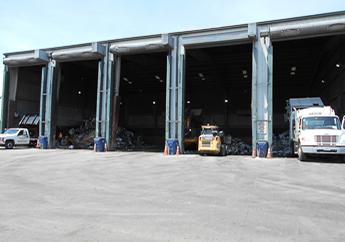The permitting process for a solid waste processing facility consists of two parts, a construction permit and an operating permit. If the permit application meets all statutory and regulatory requirements and the local governmental authority confirms the proposed facility meets all local requirements, the department must issue a permit. The department does not choose locations for proposed facilities and does not have the authority to override the local governmental authority’s decision regarding local requirements.
Construction Permit
A construction permit must be obtained before any construction activities begin, including clearing vegetation or earth work. The permit applicant must schedule a meeting with the department’s Waste Management Program before submitting the construction permit application. To apply for a construction permit, the permit applicant submits the following information:
- Permit application fee
- A complete Application For Solid Waste Disposal Area Or Processing Facility Construction Permit - MO 780-0393 form. Permits are now issued to both the “owner” and “operator”, as defined in 10 CSR 80-2.010 (67) and (68). The appropriate parties should sign the application form. Verification that the appropriate person has signed as the “owner” of the land on which the facility is located is required.
- Engineering plans and report for the facility design and operation. The plans and report must address each of the applicable sections in the Missouri Solid Waste Management Rules, 10 CSR 80-2 and 10 CSR 80-5. The regulations require the plans and report be prepared or approved by a professional engineer registered in Missouri.
- Evidence of compliance with all applicable local planning and zoning requirements, as required in 10 CSR 80-2.020(6). If the local county and/or city do not have planning and zoning requirements, the permit applicant needs to provide letters from the local county and/or city officials stating this. Applications submitted without this information will be returned to the permit applicant as incomplete.
According to Missouri Revised Statues section 260.003, RSMo, before the department can issue a permit or a grant of authority, the local jurisdiction must verify the facility that is the subject of the permit or grant of authority is in compliance with all applicable local zoning, building and health codes, ordinances and orders with regards to the regulated activity. The department is legally required to request this verification, in addition to the permit applicant providing proof of local approval. The department must obtain this verification before the construction permit can be issued. After the construction permit is issued, the permit applicant may begin construction activities. Construction permits are transferable as a permit modification.
Operating Permit
The permit applicant applies for an operating permit after all pre-operational features have been constructed. An operating permit must be obtained before the solid waste processing facility may begin accepting waste. To request an operating permit, the permit applicant submits the following information:
- A letter, sent by certified mail and signed by the owner/operator and a professional engineer, stating the pre-operational features of the solid waste processing facility have been completed in compliance with the construction permit and approved engineering plans
- Any necessary as-built drawings
If an operating permit is issued, it is effective for the life of the facility. Operating permits are transferable as a permit modification.
The department conducts public participation activities for the construction permit application, as described in section 260.205.10., RSMo. As soon as a construction permit application is received, the department notifies the public through the following methods:
- Placing a legal notice in a newspaper that serves the area where the proposed processing facility is to be located
- Mailing a certified letter to the governing body of the county or city in which the processing facility is to be located
For public notice information about any currently proposed solid waste processing facilities, visit Public Notices/ Public Comments.
Administrative Hearing Commission
Anyone who is adversely affected by the director's decision must appeal within 30 days of the decision to the Administrative Hearing Commission as provided by 621.250.3 RSMo. All appeals must be filed by petition and send to:
Administrative Hearing Commission
PO Box 1557
Jefferson City, MO 65102

